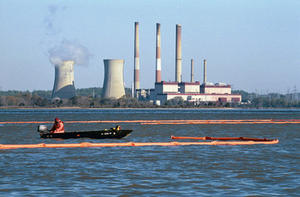EnergyGas can be a “bridge fuel” to a low-carbon future
Major new suggests that gas could play an important role as a “bridging fuel” to a low-carbon economy, but warns that it will not be long before gas becomes part of the problem rather than the solution. The research combines the latest energy system modelling techniques with analysis of U.K. gas security to assess future demand.

Multi-fuel-fired power plant // Source: noaa.gov
Major new research by the U.K. Energy Research Center (UKERC) suggests that gas could play an important role as a “bridging fuel” to a low-carbon economy, but warns that it will not be long before gas becomes part of the problem rather than the solution.
The research combines the latest energy system modelling techniques with analysis of U.K. gas security to assess future demand. A UKERC release reports that to prevent global temperatures rising above 2oC, the research suggests that further gas use will be needed in the short term to replace coal and complement the increases in low-carbon energy sources that must also occur.
This is dependent, however, on gas use beginning to fall in the late 2020s and early 2030s, with any major role beyond 2035 requiring the widespread use of carbon capture and storage. There is also significant geographical diversity in the role that gas can play in addressing climate change; with a very limited use in some regions and an extended and strong role in others.
“Gas could play an important role in tackling climate change over the next ten to twenty years,” says Dr. Christophe McGlade of UCL, who led the modelling work.
“But its role varies across the world, and advocacy of gas as a transition fuel needs a convincing narrative as to how global coal consumption can be curtailed and be replaced by low-carbon energy sources,” he adds.
Changing global demand patterns and uncertainty in the long-term prospects for gas may limit the investment required in new infrastructure. This could increase uncertainty and expose countries like the United Kingdom to price volatility in international gas markets.
“In just over a decade the U.K. has gone from being self-sufficient in gas to importing about half of the natural gas that it consumes – mostly from Norway,” says Prof Mike Bradshaw, from Warwick Business School, who led the gas security work.
“As the U.K.’s gas import dependence has grown, it has essentially been ‘globalizing’ its gas security, potentially increasing the exposure of U.K. consumers to events in global gas markets,” he adds.
To date the United Kingdom has shown resilience to international supply constraints, such as the Russia-Ukraine crisis and conflict in the Middle East. Stress tests have shown that the United Kingdom can draw additional supplies from Norway and the global LNG market. As domestic production declines, however, the U.K.’s reliance on Norwegian gas will grow. Existing Norwegian fields will begin to decline in the 2020s and the United Kingdom may have to access its gas via the continental market. This may undermine U.K. energy security.
The prospect of a U.K. shale gas revolution has been touted as a solution to domestic security of supply concerns. Production over the next decade, the key time-period where gas could act as a transition fuel, is unlikely to be of sufficient scale to significantly reduce U.K. import dependence or gas prices.
Instead of banking on shale, UKERC recommends rapidly expanding investment in alternative low-carbon energy sources and investing in more gas storage, which would help protect consumers against short-term supply disruption and price rises. Industry unwillingness to invest in additional storage is symptomatic of the high level of uncertainty surrounding future gas demand in the United Kingdom.
U.K. gas security is now intimately linked to developments in both the European and global gas markets and there is great uncertainty in both. What is required from government is a policy of ‘gas by design’ that plans now for the changing role of gas in the U.K. energy mix; ensuring future U.K. gas security and a smooth transition to a low-carbon economy.
— Read more in Christophe McGlade et al., A Bridge to a Low-Carbon Future? Modelling the Long-Term Global Potential of Natural Gas (UKERC, November 2014); and Mike Bradshaw et al., The U.K.’s Global Gas Challenge (UKERC, November, 2014)
